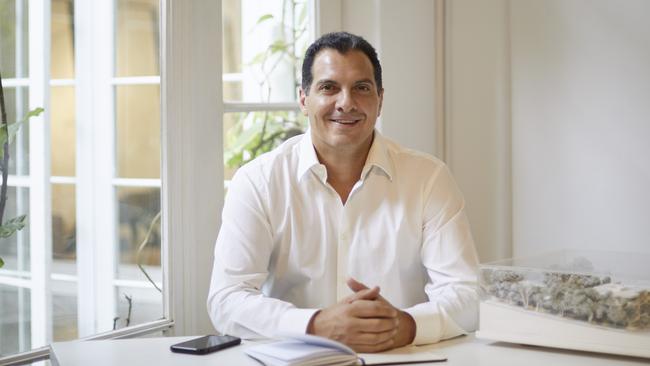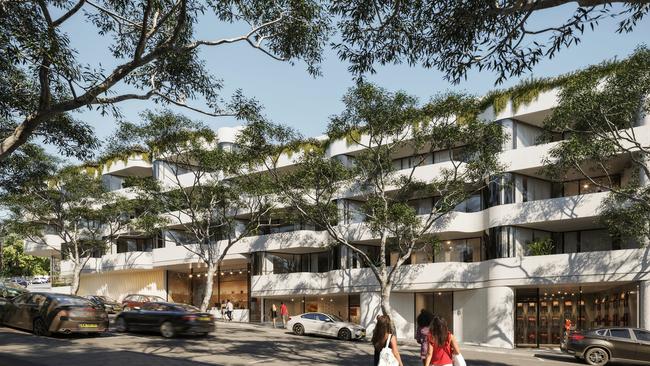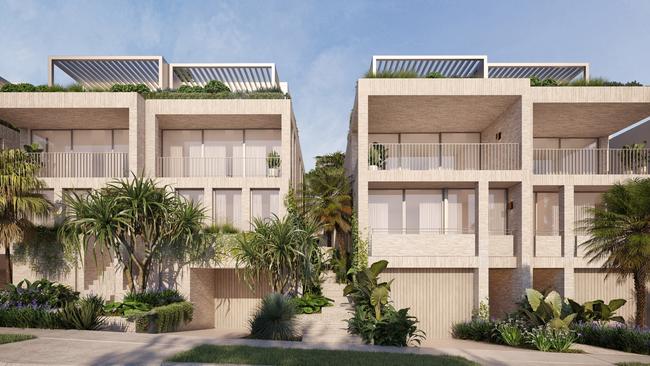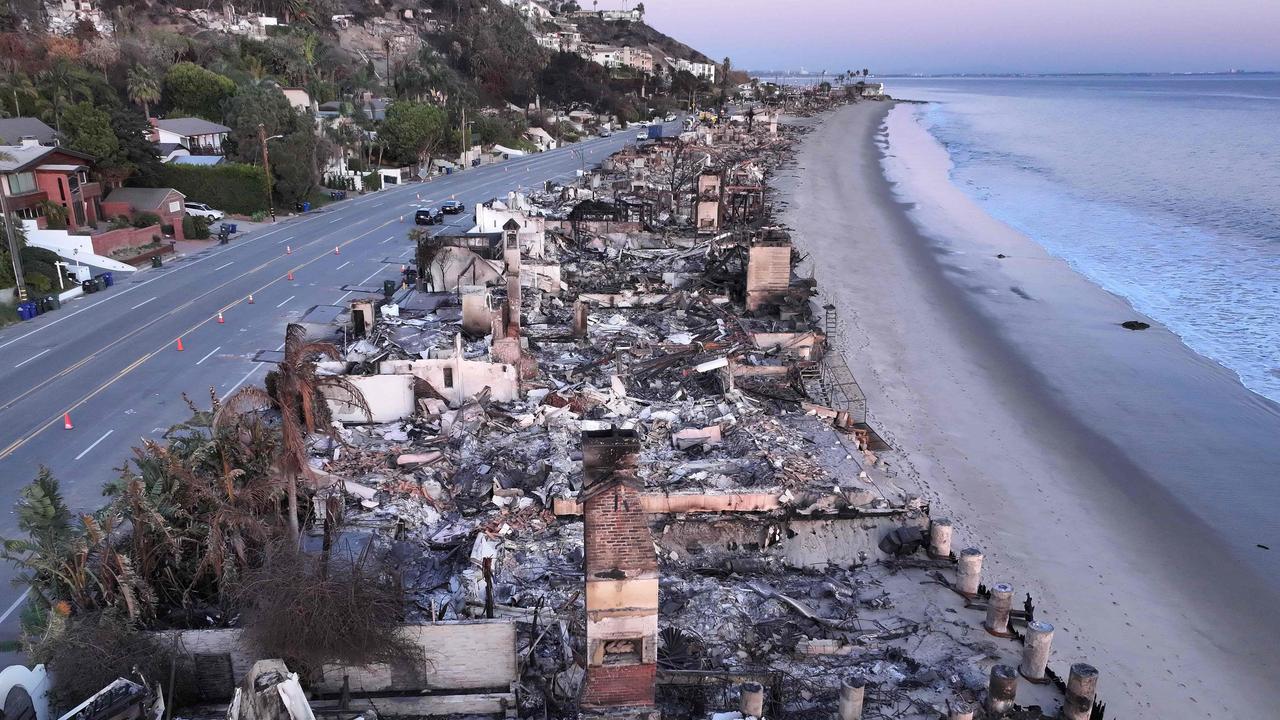Pallas Group developer Fortis in sale mode after rapid expansion
Relentless expansion by Pallas Group’s development arm funded by a bevy of 800 wealthy investors sees it saddled with a glut of sites it now appears to be looking to sell.

Business
Don't miss out on the headlines from Business. Followed categories will be added to My News.
The development arm of Sydney-based property and finance house Pallas Group is in the eye of the storm engulfing property markets, after striking deals worth billions in the last five years.
Fortis, headquartered in Pallas’s Double Bay base, has made a name for itself with opulent projects funded by a bevy of 800 wealthy families and businesspeople, alongside lenders keen to grab a slice of the double-digit returns on offer.
But relentless expansion by Fortis now sees the developer saddled with a glut of sites, both under way or due to settle.
This comes as capitalisation rates have soared as commercial property valuations have plummeted, and higher interest rates erode potential returns and boost borrowing costs.
Cap rates are reflective of a property’s valuation in relation to its future rate of return.
Several new projects have been added to the long list of purchases made by Fortis and its boss Charles Mellick, and funded by Pallas Capital, but even investors admit the property empire assembled may have grown too quickly, with little headroom for delays or mistakes.
In the first quarter of 2023 Fortis picked up new sites in Melbourne and Sydney, including an as-yet unannounced lot in Elizabeth Bay the developer picked up for $78m on a two-year settlement.
That’s on top of sites in Edgecliff, Darling Point, South Melbourne, Zetland and Richmond snapped up last year.
Fortis claims 17 projects are currently under way across Sydney and Melbourne.
The developer claims to be sitting on almost $2.25bn in projects in the pipeline, split almost evenly between Sydney and Melbourne.
Pallas Capital has a loan book of almost $1.63bn across 213 loans.
Its buying streak has surprised many rival property figures, who have seen similar projects stalled by a lack of finance, unable to make costs and returns stack up.
Fortis purchased a site in Thomson St, South Melbourne for $8.6m in 2019, just two months after the block had been snapped up by another company for $6.8m.
The developer also waded into St Kilda, purchasing a site in Fitzroy Street for $21m, in a deal rival developers epc.Pacific turned their noses up at.

Fortis’s tally of sites is increasingly leaving the developer with a long list of unsold lots or sites where offers are coming in well below initial expectations.
Property and debt brokers contacted by The Australian reported that several sites across Sydney and Melbourne were expected to trade for well below what was paid for them in the past two years.
The highly acquisitive firm’s property moves have generated headlines but it now appears to be in sales mode, with real estate insiders picking up on the switch.
Fortis is understood to be seeking to sell its site in Palmerston Crescent, South Melbourne for $37m after completing the development.
Fortis tried to flip its site in Clifton Hill, in Melbourne’s inner north for $50m in 2021, but failed to land a sale after investors came back with offers around $40m.
This came after Fortis purchased the site in 2020 in a $32m deal.
Fortis has also been attempting to offload the three of nine lots at its Marmont site, in Double Bay, but the developer was left holding them after they failed to sell.
The developer was also left holding the penthouse at its Chalmers St project in South Yarra.
Pallas Group chief executive Patrick Keenan told The Australian it was “not unusual” the company’s principals had been left with the stock.
Mr Keenan said together the Pallas Group principals owned completed properties “with a total value of $177m and intend to retain other properties (under construction) with an additional value of about $405m”.
Several Fortis sites the firm paid big money for have also been knocked back after the developer’s dreams were terminated in planning.
Fortis’s plans to demolish a collection of apartments and build 10 luxury homes on a $44m site purchased in Sydney’s beachside suburb Bronte were knocked back by Waverley Council in August, although the company has appealed the decision.
Fortis was also awarded rights to demolish and redevelop Double Bay’s maligned Cross St car park, in a deal expected to cost $10m.

Rival developer Built pulled its interest in the project, claiming the “changes in market conditions have significantly affected the viability of the project”.
Fortis said it delivered a $12.8m pre-tax profit in the 2022 financial year on $45m in revenue.
The Pallas Group is projecting pre-tax profits of $20m-plus this year on about $65m in revenue.
Mr Mellick’s vision has been to grow Fortis, but some industry watchers are cautious of his record after the failure of his previous operation.
Trico Constructions slipped into liquidation in 2017, but this came after the company was repeatedly chased by the Australian Taxation Office for tax debts repeatedly defaulted on by the business.

Mr Mellick ran the firm as director from 2010 until a month before it was placed in liquidation in 2017.
The collapse came after Trico Constructions ran out of cash on several projects it was building across Sydney’s eastern suburbs, including a major job at Bellevue Hill.
Mr Keenan said the allegation of insolvent trading was made “before receiving any comment from Mr Mellick”.
“Mr Mellick’s lawyers wrote a detailed letter to the liquidator in May 2018 explaining why the allegation was incorrect. The liquidator has taken no action since receiving that letter,” he said.
KPMG documents from 2020 showed liquidators recommended Mr Mellick be publicly examined “to ascertain each of the Directors’ capacity to meet any subsequent claim(s) for compensation”.
But liquidators warned the effort may prove fruitless given “the Directors are likely to defend any proceedings brought against them”.
“It is worth noting that Mr. Mellick was not a Director of Trico Constructions when it failed. As a shareholder, he loaned an additional $500,000 to that company only a few weeks before it was placed in voluntary administration and this money was lost, together with another $1.9 million that he had loaned to that company previously,” Mr Keenan said.
Originally published as Pallas Group developer Fortis in sale mode after rapid expansion





